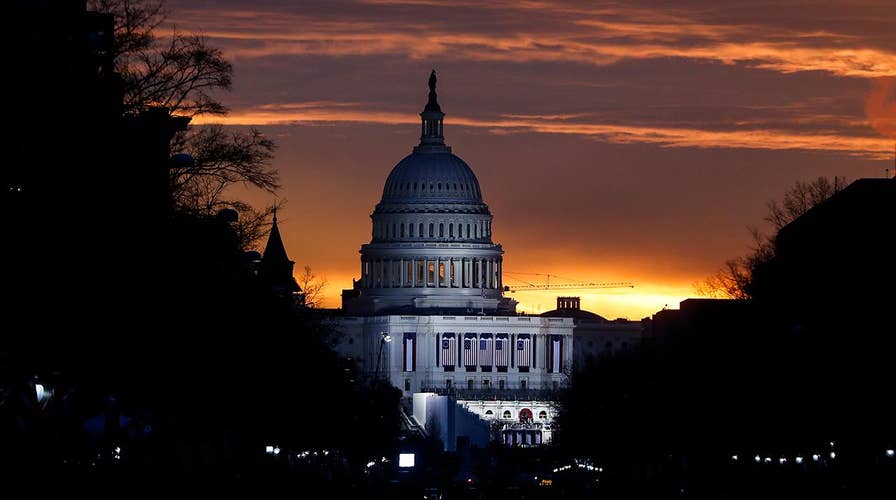Deal or no deal, will there be a government shutdown?
Garrett Tenney reports from Washington, D.C.
WASHINGTON – A blame game will consume Washington if the government shuts down this week.
But first, lawmakers from both sides of the aisle must play the dare game.
Republicans will essentially dare Democrats to vote no on an interim spending plan to avoid a shutdown. If Democrats vote yes, the government remains open. But if Democrats cast nay ballots, Republicans will try to turn that decision against vulnerable lawmakers in the midterm elections.
By the same token, Democrats will dare Republicans to reject the same stopgap plan. This is a hope that the GOP -- wielding majorities in both the House and Senate and President Trump occupying the White House -- will present themselves as incapable of governing. A nay vote by Republicans could trigger a government shutdown. Democrats will cast the shutdown as emblematic of the bedlam associated with the Trump presidency.
The irony is that neither side truly wants to stumble into a government shutdown this weekend. But Republicans and Democrats alike are daring the other side to do so.
If the government shutters, only then will the sides engage in a ritualistic tournament of blame.
Here’s what’s at stake:
House Republican leaders hope to approve an interim spending bill to run the government through February 16 and avert a shutdown. Latched to the package is a multi-year extension of a popular health care coverage plan for children. The bill is notably devoid of any DACA language to help persons brought to the U.S. illegally by their parents.
But here’s the problem: Republicans may lack the votes on their side to pass the plan unilaterally without seeking Democratic support. Conservatives and members of the Freedom Caucus balk over a host of issues. Many Republicans seethe that their leaders authored a fourth emergency bill to fund the government and not a full-blown plan for the balance of the year. Republican defense hawks are apoplectic they haven’t secured a hike in military spending. Some GOPers like Reps. Ileana Ros-Lehtinen, R-Fla., and Carlos Curbelo, R-Fla., won’t vote yes because the party has yet to address DACA.
House Republicans can only lose 23 votes on their side of the aisle before needing Democrats to fill the void and approve the Continuing Resolution or “CR,” Congressional shorthand for the caretaker spending package. Democrats won’t budge unless they marshal a DACA fix.
“It needs to be in the CR,” said House Minority Whip Steny Hoyer, D-Md.

House Minority Whip Steny Hoyer, D-Md., walks past reporters on Capitol Hill in Washington, Thursday, Nov. 16, 2017. ((AP Photo/Susan Walsh))
House Republicans whipped the CR Wednesday afternoon to assess their internal vote tally. A senior Republican source described the whip count as “standard” starting place for most bills of this magnitude.
“They do not have the votes,” augured House Freedom Caucus Chairman Rep. Mark Meadows, R-N.C. “Now I’m not saying they won’t have the votes….”
Meadows described the circumstances as “fluid.” But the North Carolina Republican doubted there would be a government shutdown “because nobody wants one.”
“They do not have the votes.”
However, Meadows observed that Republican leaders continue to punt, repeatedly engineering provisional bills which fund the government for short spurts. Congress OK’d the first CR in September, followed by two encore CRs in December.
“At some point you have to decide why the fourth CR is different than the second or the third and I don’t think there’s a compelling case,” said Meadows.
Meadows observed the House is scheduled to be out of session next week and then meet in abbreviated stints in late January and early February. That almost stretches until when the funding would again lapse. Lawmakers of both parties scratch their heads as to how they can forge a pact between now and mid-February.
So, the House is slated to vote on the CR today. Will it work?
“Yes,” predicted Rep. Mike Simpson, R-Idaho. “Because we don’t want to be here Saturday.”
Then there’s a question if such a measure could make it through the Senate. The bill must hurdle the threat of a filibuster by commanding 60 yeas. Sen. John McCain, R-Ariz., is still out, convalescing after surgery. That means the GOP has only 50 members with which to work. If Republicans stick together, they’d have to enlist the support of at least ten Democrats to crack the 60 vote threshold.
“That is a high bar,” conceded Sen. James Lankford, R-Okla., when asked if all Republicans would vote in lockstep.
“I don’t think it’s a given that everyone votes yes,” said Sen. John Thune, R-S.D., the third-most senior Republican in the body. “It will take a little whip work to get there.”
The whipping could start with Sen. Lindsey Graham, R-S.C., a fierce advocate of boosting defense spending.
“I’m not going to vote for a CR. You’re destroying the military here,” said Graham.
Graham says short-term spending measures disproportionately wound the military compared to other areas of government. It makes it hard for the Pentagon to plan and train.
“I think we’re back in the land of the CRs,” said Graham. “Anybody who thought you could get defense funding without doing DACA was pretty naïve.”
Even so, could some Senate Democrats feel pressure to vote for the CR based on the children’s health insurance program provision alone? Consider Democratic senators facing re-election this fall in competitive states. Republicans would love to dare Sens. Joe Donnelly, D-Ind., Joe Manchin, D-W.Va., and Claire McCaskill, D-Mo., to vote against children’s health insurance. A roll call vote like that would supply Republicans with good political fodder. But again, Republicans must supply sufficient votes from their side.
That’s far from a certainty.
Otherwise, the government shuts down. Or, Republicans have to turn to another tactic.
Aside from the current gambit, it’s likely Congress can try two other approaches to avoid a shutdown. Lawmakers could adopt a clean CR, simply re-upping all funding at current levels. But senior sources say there’s no way to decouple children’s health dollars from the spending package. The other option is a CR loaded with a DACA fix. That maneuver would command the votes of some Republicans and scores of Democrats. But Republican leaders may not be leaders much longer if they take that approach.
So, what happens today?
“We’ll learn something soon about (House Speaker) Paul Ryan, R-Wis.,” said one House Republican about the current CR scheme. “We’ll know if Ryan can pull this off, or if he’s only good at passing tax reform.”
“If there is a shutdown, our fingerprints aren’t on it,” said Rep. Louise Slaughter, D-N.Y., of her Democratic colleagues.
So first, there’s the dare game. We’ll likely know today which side won the dare. But if the government shuts down, we may have to wait until November to see who emerged victorious in the blame game.













































